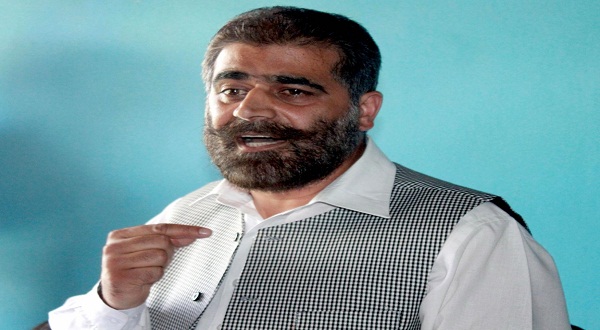Mushtaq Ul Haq Sikander
Islam in Kashmir was spread by the Peaceful missionary activities of the Sufis. The common masses were reeling under the dictatorship of exploitative kings and religious clergy. Most of them were illiterate peasants, who found in Islam the egalitarian social justice and equality for all. Hence over a period of time they accepted the alien creed as their faith. The important Sufi who is pioneer of Islam in Kashmir, was a Kubrawi Sufi, Mir Sayyid Ali Hamdani(R.A), known to Kashmiris as Amir e Kabir, Shah e Hamdan and Ali e Thani. He proved to be a harbinger of Social and Economic revolution in Kashmir. To celebrate and pay tributes to his life and legacy, the Islamic Studies department of Kashmir University, named after him as Shah-e- Hamdan Institute of Islamic Studies, organized a Three Day International Seminar from 13-15 March, 2012. The seminar was titled as “Shah-e-Hamdan’s contribution to learning and society”. The department under the dynamic Directorship of eminent scholar, academic, writer and activist Prof Hamid Naseem Rafiabadi is progressing by leaps and bounds. This seminar was a part of the academic programmes undertaken by Prof. Rafiabadi.
I as a student of Political science was also invited to present a paper on the Political Thought of Mir Sayyid Ali Hamdani(R.A). I confined my paper with the study of his Political Thought as espoused in his famed work, “Zakhiratul Maluk”. My argument was that for a student and scholar of political science Hamdani appears as a moral theorist rather than a systematic political scientist in the book. In this book his personality manifests itself as a Sufi more than as a seasoned political realist. There is no discussion about the State Formation, Resource Allocation, Political Adjudication, Political Participation, Political Socialization, Political Culture, Political Development or Political System. Hamdani also appears least bothered about the form of government.
As a political treatise it fails to impress its readers, but herein lies its essence and virtues. Mir Syed Ali Hamdani (R.A) is a Sufi belonging to Kubrawi order. All Sufis lay much emphasis on Tazkiya e Nafs (self purification), and each chapter of the book is a living testimony of this fact. He wants a Muslim ruler’s soul to be purified as he attains the reins of governance. The first four chapters of the book deal with faith, duties of a man, virtues and rights and duties towards parents, wives, husbands, children etc. Mir Syed Ali Hamadani’s style of writing is to draw lessons from Quran, Sunnah and lives of various righteous men, in order to create love for Allah, his creations and fear from his wrath and punishment for breaking his laws. The teachings and lessons as espoused in these chapters are essential for any human being to discipline himself as a God Fearing Muslim, who has purified his Nafs from the baser and lower beastly instincts of lust, greed and blind hedonism. When he has attained this purification, only then can he deliver the rights of his subjects and rule justly.
Then the ruler is supposed to Command good and forbid evil. He is also supposed to be thankful and content at what Allah has bestowed on him. He should always be fearful about trampling the rights of his subjects. While carrying out the duties of governance he is faced with a lot of obstacles, impediments and problems which are to be dealt with patience, which is the divine tool. Lastly the evils of Anger and Arrogance are depicted alongwith virtues of humility and forgiveness towards his subjects.
This scheme of chapterization leaves the book open to debate whether it can be considered as a Political treatise or a charter on State craft? I concluded with the remarks that the book still remains relevant, as Hamdani wants the rulers to be noble men who have purified their souls from the baser instincts of lower self like greed, lust, thirst for power etc. If the rulers today attain this Tazkiya e Nafs (self purification) at first, then go for Power much of the vices emanating from Power will come to an end.
What drew flak from the audience, were my comments that “Islam’s ultimate aim isn’t capture of power, but the individual self purification (Tazkiya e Nafas) so that the person becomes a better human being, contributing towards the overall welfare of Society and humanity. These purified souls wouldn’t indulge in any beastly acts based on their lower instincts of self like lust, greed and hedonism. Wherever they go, they will prioritize and put before collective needs over their personal ones. In certain cases they will also sacrifice individual needs for collective ones. But are we as Muslims contributing to the collective good and welfare of humanity? The answer is a complete Big No; though there may be few individual efforts, but as a Muslim community we have failed to contribute towards the society positively. Even if Muslim parties come to power somewhere, they try to impose legal injunctions of Islam more vehemently than moral ones. The Muslims are suffering from moral waywardness all over the world, the Muslim states are the most corrupt and least democratic. These short comings need to be remedied at first rather than going for Shariah imposition. Also the imposition of Shariah as prevalent in various Muslim countries doesn’t solve the problem of poverty, environmental pollution, injustice, corruption and political instability”.
Many among the audience strongly criticized me by stating that Shariah has all the solutions only the need is to get it imposed as soon as possible. They unlike Mir Sayyid Hamdani(R.A) couldn’t understand the essence of Tazkiya e Nafs. It is an apathy that wherever Islamist parties come to power they seek to impose legal injunctions of Shariah more vehemently especially in case of women and minorities, than the core values of Quran which include, Justice (Adl), Compassion (Rahmah), Benevolence (Ehsan), Truth (Haq) and Wisdom (Hikmah). Instead they are more concerned about the lengths of Burqas of women and how to control their bodies. Also the laws of punishment are imposed as if Islamic Shariah is only about Hudud laws.
The claims of imposition of ‘Shariah’ in countries like Saudi Arabia and Iran didn’t take us near to the Islamic and Quranic model of Social Justice and Non Discrimination. Instead we have the rule of elites, who justify their rule in the name of Islam. The laws are discriminatory towards women and minorities.
While Islam and Quran debars any kind of discrimination in the name of religion and gender, but we find them evidently in case of Women in Saudi Arabia and Bahais in Iran. The problem still lies with the indifference of Muslims towards Tazkiya e Nafs and their romanticism with Political Islam.
History is a witness to the fact that Islam has survived without Power Politics and will continue to thrive in future too. The peaceful spread of Islam in various parts of the world by the Sufis is a testimony about the fact that Islam doesn’t need political patronage for its spread.
Hence the need as has remained since time immemorial to produce the best human beings who are an epitome of humane qualities of selflessness, dedication, pluralism, tolerance, justice, love and peace. Despite our material progress and technological advancement, the need retains and political ethics as deliberated by Mir Syed Ali Hamdani(R.A) are going to fulfill those.
Mushtaq Ul Haq Ahmad Sikander is Writer-Activist based in Srinagar, Kashmir and can be reached at sikandarmushtaq@gmail.com
BOX
Islam in Kashmir was spread by the Peaceful missionary activities of the Sufis. The common masses were reeling under the dictatorship of exploitative kings and religious clergy. Most of them were illiterate peasants, who found in Islam the egalitarian social justice and equality for all.
BOX2
While Islam and Quran debars any kind of discrimination in the name of religion and gender, but we find them evidently in case of Women in Saudi Arabia and Bahais in Iran. The problem still lies with the indifference of Muslims towards Tazkiya e Nafs and their romanticism with Political Islam.


















Leave a Reply